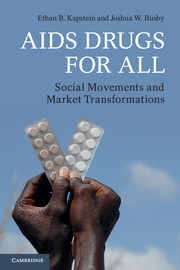Book contents
- Frontmatter
- Contents
- Preface
- Figures
- Tables
- Abbreviations
- 1 Introduction: global markets and transnational social movements
- 2 Industry structure and movement opportunities
- 3 Drugs = life: framing access to AIDS drugs
- 4 Movement coherence and mobilization
- 5 Advocacy strategies to address costs
- 6 Institutions to stabilize the market
- 7 Lessons for other campaigns
- 8 Conclusions: implications for research and policy
- References
- Index
7 - Lessons for other campaigns
Published online by Cambridge University Press: 05 June 2014
- Frontmatter
- Contents
- Preface
- Figures
- Tables
- Abbreviations
- 1 Introduction: global markets and transnational social movements
- 2 Industry structure and movement opportunities
- 3 Drugs = life: framing access to AIDS drugs
- 4 Movement coherence and mobilization
- 5 Advocacy strategies to address costs
- 6 Institutions to stabilize the market
- 7 Lessons for other campaigns
- 8 Conclusions: implications for research and policy
- References
- Index
Summary
Regardless of the structure of the coalition, early work done to get all participants on the same page philosophically and strategically seems to be crucially important. Given enough time and mutual trust, a group can often find a way to converge around a rough policy agenda.
Center for Nonprofit Studies report on Lessons from Six Successful Campaigns, including US advocacy that contributed to PEPFAR, 2005Since the global AIDS treatment movement helped catalyze a dramatic increase in resources to fight the pandemic, advocates for other global causes have sought to learn from its success. In 2005, for example, the Center for Nonprofit Studies and the Aspen Institute issued a report of six successful campaigns that helped stimulate US engagement internationally on development and poverty, one of them being AIDS treatment mobilization (Chawla 2005). Likewise, in 2007, the US Coalition for Child Survival sponsored a report that sought to explain why advocates were successful in pushing for the creation of PEPFAR (McDonnell 2007). As we will see later in this chapter, “malaria activists” have also sought to draw lessons from the HIV/AIDS campaign.
Indeed, movements for universal access to such goods as education have sought to emulate some of the specific organizational innovations wrought by AIDS treatment advocacy. In 2009, in a Brookings Institution paper, David Gartner, himself a former spokesperson for the Global AIDS Alliance, championed a funding mechanism for education, writing, “A Global Fund for Education should also draw on the successful experience of other innovative global development financing mechanisms. Among the most successful of these new organizations is the Global Fund to Fight AIDS, Tuberculosis, and Malaria (GFATM).” He credited the Global Fund with mobilizing billions of dollars for health and noted that “[o]ne of the keys to the GFATM's success in resource mobilization has been the strong engagement of both civil society and developing countries as full partners with donors in its governance” (Gartner 2009b).
- Type
- Chapter
- Information
- AIDS Drugs For AllSocial Movements and Market Transformations, pp. 213 - 254Publisher: Cambridge University PressPrint publication year: 2013



